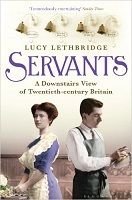Servants: A Downstairs View of Twentieth-Century Britain - Lucy Lethbridge

Servants: A Downstairs View of Twentieth-century Britain - Lucy Lethbridge

Non-Fiction
Pages: 400
L.P. Hartley famously wrote, "the past is a foreign country, they do things differently there" - and reading about the upstairs/downstairs world of Edwardian servants only serves to reinforce that impression. The world of Downton Abbey and Upstairs Downstairs is so far removed from most people's experience of life that a book like this really does read like another world, another life, one infused with a soft glamourous nostalgia. The Edwardian era was probably the high-point of the English cultured classes - the 'golden age' before the First World War uprooted everything and turned England into a more recognisably modern world.
But of course, it was only a golden age if one were lucky enough to be born into the upper or comfortable middle-classes, where one had staff or people to cater to almost every whim. That said, even in what we would today consider lower-middle class homes, at least one servant would be employed. The domestic service industry was almost a default option for a huge number of working people and many followed their parents and even grandparents into working for one family or huge country estate their whole lives. There was little of the condescension or contempt associated with being a 'servant' that we might consider today, largely because there were so few other options. But the 20th century changed all that.
Lucy Lethbridge's book follows the lives of both the masters and the staff, in all manner of homes, from the grandest of country estates to London townhouses, rural parsonages and suburban homes, throughout the years of the twentieth century. Prior to 1900 (as a ballpark figure) life in service altered little through the centuries - but the pace of change in the twentieth century was to fundamentally alter the entire domestic service industry for good. Modern developments in the welfare state, increased taxation and death duties for the upper classes, increased choice of career options, equality for women and the rise of labour-saving technology meant that fewer people were choosing life in domestic service and fewer people could afford the armies of staff of previous centuries.
It's an exhaustively researched book, enlivened by many personal memories and accounts taken from interviews and memoirs. Some staff look back fondly on their days in service, the families they served, and the job security they enjoyed; others remember it with bitterness. The lives of the Edwardian aristocracy almost beggar belief on occasion - it's hard to envisage a life of such indolence and luxury that ten people might be involved in the preparation of a simple cup of tea! And yet we clearly harken back to such days with some nostalgia - the popularity of period dramas such as Downton Abbey attest to that!